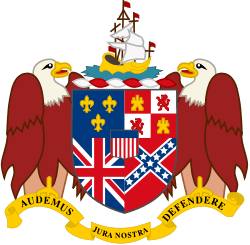Emmet O'Neal
| Emmet O'Neal | |
|---|---|
.jpg) Emmet O'Neal | |
| 34th Governor of Alabama | |
|
In office January 17, 1911–January 18, 1915 | |
| Lieutenant | Walter D. Seed, Sr. |
| Preceded by | B. B. Comer |
| Succeeded by | Charles Henderson |
| Personal details | |
| Born |
September 23, 1853 Florence, Alabama |
| Died |
September 7, 1922 (aged 68) Birmingham, Alabama |
| Resting place | Florence Cemetery |
| Political party | Democratic |
| Spouse(s) | Lizzie Kirkman |
| Occupation | Lawyer |
Emmet O'Neal (September 23, 1853 – September 7, 1922) was an American Democratic politician and lawyer who was the 34th Governor of Alabama from 1911 to 1915. He was a reformer in the progressive mold, and is best known for securing the commission form of government for the cities of Alabama.
Career
O'Neal was born on September 23, 1853 in Florence, Alabama to Edward A. O'Neal and Olivia Moore O'Neal. His father Edward A. O'Neal was a Confederate Army officer and served as Governor of Alabama from 1882 to 1886, as a Democrat. O'Neal received his early schooling in Florence and was a student at the University of Mississippi in 1870 and 1871. He received the degree of A.B. from the University of Alabama in 1873. Reading law under the supervision of his father, he was admitted to the bar in Florence in 1876. In 1901 and in 1910 he was elected and served as president of the Alabama Bar Association. In 1911 he was made a member of the governing board of the American Bar Association.[1]
State politics
O'Neal served as a presidential elector in Alabama's 8th congressional district in 1888 and was an elector at large from Alabama in 1892 and 1908. He was appointed as United States District Attorney for the Northern District of Alabama and served in that capacity from 1893 to 1897. In 1901, he served a member at large in the Constitutional Convention of 1901, where he served as a member of the committee on rules and regulations, chairman of the committee on local legislation and a member of the committee on suffrage. He played a large role in framing the suffrage provisions so as to eliminate the illiterate black vote without running afoul of the US Constitution as then interpreted. In the runup to the 1908 presidential election, he made an extensive speaking tour in the West campaigning for William Jennings Bryan. In 1909, he campaigned against the addition of a prohibition amendment to the Constitution of Alabama.[1]
Governor 1911-15
O'Neal was elected governor in 1910, began his term of service in January 1911, and served for four years. Among the more important events of his administration were the improvement of the convict system, the impetus given to good roads and the creation of the State Highway Commission, rigid enforcement of law by the calling of special terms of court and the employment of special counsel in cases both civil and criminal where the interests of the public and the State were concerned, commission form of city government, and improvement in the judiciary. He was active in urging a new constitutional convention and his legal writings were published and read.[1]
He was an active member of the Governors' conference and took part in all the debates during his term. At the meeting of the Governors' conference in Richmond he delivered an address on the importance of establishing a system for rural credit (including the availability of cooperative credit unions, cooperative land banks, and similar organizations), and was a pioneer in that movement which resulted in Congressional legislation on the subject. O'Neal was chairman of the Alabama delegation at the 1912 Democratic National Convention that resulted in the nomination of Woodrow Wilson for president. At the time of the conference of Governors, Governor O'Neal served as a member of the executive committee of that body.[1]
Middle-class business and professional activists in the cities were frustrated with the old-fashioned politicized city governments, and demanded a commission formed in which municipal affairs would be very largely run by experts rather than politicians. Governor O'Neal made the commission system his favored reform, and secure its passage by the legislature in 1911. The cities of Birmingham, Montgomery and Mobile quickly adopted the commission form[2]
Other activities
He was a member of the Knights of Pythias, the Elks, the Presbyterian church, and the Phi Beta Kappa society. In 1915, Governor O'Neal was appointed referee in bankruptcy, with offices in the Federal building in Birmingham. After his term as governor, he also worked in manufacturing in Birmingham, serving as secretary and treasurer of the Southern Steel Works Company. Governor O'Neal was a frequent contributor to The North American Review and other publications. He also served as a vice-president of the American Bar Association.[1]
On July 21, 1891, Governor O'Neal married Elizabeth Kirkman, the daughter of Colonel Samuel Kirkman. They had three children, Kirkman, Olivia and Elizabeth.[1]
References
External links
| Political offices | ||
|---|---|---|
| Preceded by B. B. Comer |
Governor of Alabama 1911–1915 |
Succeeded by Charles Henderson |
